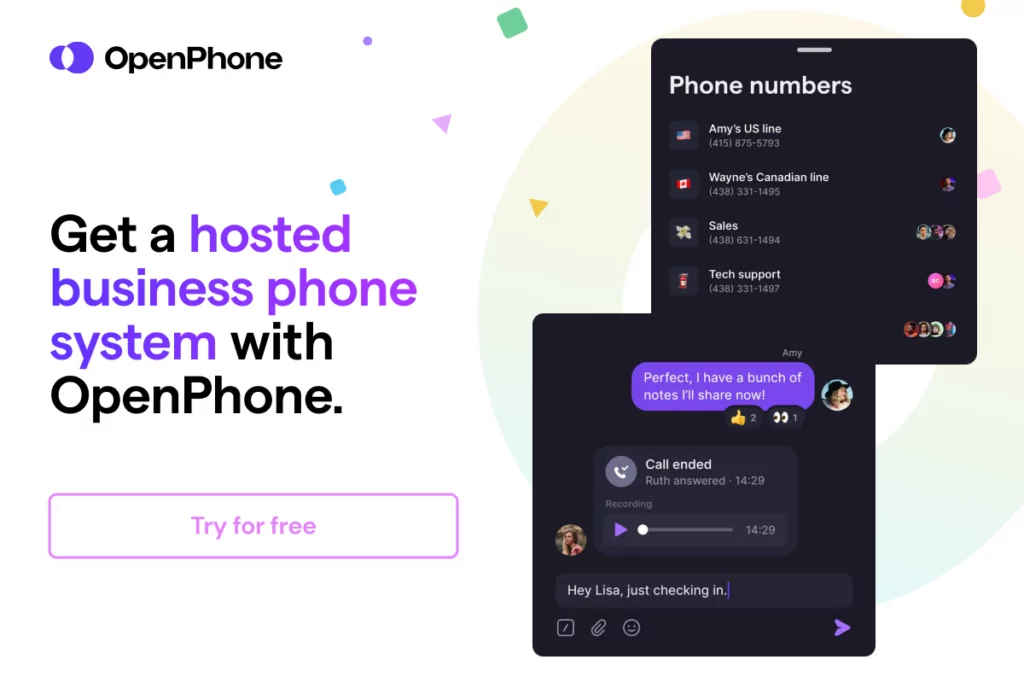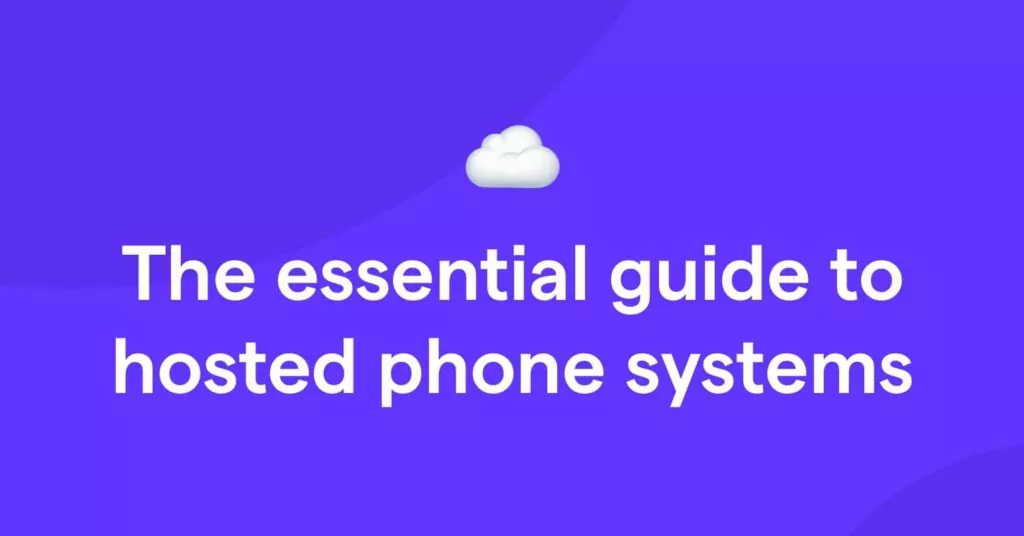Most business owners are familiar with the concept of cloud software, and you may have already shifted some of your business operations to the cloud. But while hosted, cloud-based phone systems are highly sought after by small business owners everywhere, many still aren’t sure exactly what a hosted phone system is, how to set up a system, and how it can help their business scale.
In this guide, we’ll cover what you need to know about hosted phone systems. This includes how they work, why businesses use them, and the numerous business benefits they provide.

What is a hosted phone system?
A hosted phone system is any business phone system that requires internet access and is hosted for you away from your company’s location. One example is a Voice over Internet Protocol (VoIP) business phone system.
A VoIP system routes calls via the internet, rather than through traditional public telephone lines. That allows you to have the best of both worlds: all of the features of traditional PBX systems combined with the convenience of VoIP.
Virtual VoIP-hosted phone systems are a game-changer when it comes to managing business communications. They connect all of your company devices to an external VoIP data center hosted in the cloud. ☁️ That way, your team can make and receive phone calls from any device with an internet connection — without you needing to physically store and manage servers and other hardware.
How does a hosted phone system work?
With most modern hosted phone systems, your office phone system will exist in the virtual cloud, which you connect to for a monthly fee. If you have a hosted system routed through desk phones, those phones will need to stay in the office to connect to the service. But you can even do away with these phones when you opt for an entirely virtual hosted phone system.
With an entirely virtual system, you can use any internet-enabled device, such as a computer or cell phone, to access your business phone number (or numbers). This allows you to ditch hardware maintenance and setup, meaning your IT department (or anyone tasked with this work) can focus on other priorities. You simply have to download your hosted phone system provider’s business phone app to your device to begin placing and receiving calls.
Your team will enjoy the flexibility of using any internet-enabled device as a business phone, whether they’re in the office, traveling, or working from home.
When you receive an incoming call, your hosted phone system works something like this:
- The incoming call goes to your hosted system, which then converts the call data into digital packets. Those packets can be easily sent and received with a stable internet connection.
- The hosted system routes the call to your business phone, which could be a VoIP-enabled desk phone or any device with an internet connection.
- You pick up the phone, the digital packets are translated back into voice data, and the connection with the caller is in place. You can now begin speaking.
This all happens in an instant and functions as quickly and smoothly as a traditional phone call.
Why businesses use hosted phone systems: The benefits
There are many factors to think about when your business is considering making the switch to a hosted phone service. The main benefits include perks not offered by traditional, on-premise PBX systems, such as:
- Cost saving: Hosted VoIP phone systems are far more cost-effective when you factor in the costs of traditional systems’ hardware and installation labor. They also allow you to make use of the equipment and mobile devices you may already own. That includes desk phones, VoIP headsets, and computers or cell phones by using softphone software.
- Collaboration: Because VoIP phone services utilize the internet to connect and route calls, they have more modern capabilities compared to traditional phone systems. Some VoIP providers offer advanced collaboration features, such as shared phone numbers. Your phone system will serve as a communications platform where multiple departments can communicate both internally and externally.
- Flexibility: It’s estimated that by 2026, over 40 million Americans will work remotely. Spurred on by pandemic safety concerns and enhanced productivity goals, the US workforce is becoming more and more distributed by the day. With a virtual hosted phone system, you don’t need to be in the office to accept business phone calls. Simply adjust your caller ID settings in OpenPhone’s mobile app, and your customers will be none the wiser that you’re speaking from home, a cafe, or the airport.
- Easy installation and maintenance: Hosted phone systems also aren’t susceptible to the numerous setup problems of traditional phone systems. You won’t have to worry about tangled wires or complicated equipment. You can even set up a cloud-based hosted phone system online with your desktop or smartphone. Your provider will take care of system maintenance for you, so you can make use of the latest tools automatically.
- Scalability: As with any business decision, you should keep scalability in mind when deciding on a provider and business phone system. With OpenPhone, it’s never been easier to assign teammates a new number or share an existing business phone number — just invite them on our app, and you’re good to go.
Potential barriers to using cloud-hosted systems
Of course, as with any technology, cloud-hosted business phone systems do come with a few possible drawbacks.
Having a slow internet connection with limited bandwidth is the biggest barrier to making good use of your cloud-hosted phone system. While VoIP calls generally use small amounts of data, ensure your office or home internet connection can handle your new hosted phone system before diving in.
This can get a bit trickier if you are working with a remote team, but typically, it isn’t hard to verify everyone has adequate access to the internet with a simple VoIP speed test.
Another disadvantage to cloud-hosted phone systems are the need for a WiFi router and the network to be connected to power. This reliance on electricity could cause problems during severe weather events, power outages, or times with a shaky network connection. Traditional telephone systems, also known as POTS (Plain Old Telephone System), deliver calls over copper wires that can work even without power depending on your hardware setup.
Also check that your provider offers free calls to the US and Canada and affordable international calling plans like OpenPhone, or else a hosted phone system could lead to unexpectedly large bills.
Some providers also require you to sign an annual contract upfront, locking you in for at least a year. OpenPhone gives you the option to pay monthly instead, allowing you the flexibility to explore all your new phone system has to offer without a long-term commitment.
6 must-have hosted phone system features
When browsing around for the perfect VoIP provider, your business needs should be your top consideration. Think about these must-have hosted phone system advanced features to get the most functionality out of your cloud telephony system:
- Auto-attendant: Auto-attendants or IVR is an efficient way of routing incoming calls to save time for both your customers and team.
- Call recording: Call recording is essential to monitor the quality of service your team provides. For teams actively measuring how well they’re serving customers, call recording can help improve customer satisfaction rates. They can also be a helpful record of what’s been said when multiple team members are dealing with a customer.
- Business app integrations: Your OpenPhone account can be synced with apps like HubSpot and Slack for easier communication.
- Messaging: Not all business is conducted over voice calls, which is why SMS and MMS capabilities are essential in today’s business world.
- Voicemail: If customers call after-hours, you’re out of the office, or you’re simply too busy to pick up, reliable voicemail features are a must-have. Even better is if your system supports voicemail transcription features or allows you to set precise business hours.
- Good call quality: When customers call, they won’t be impressed if they can’t hear the person speaking on the other end of the line. One of the misconceptions of VoIP phone systems is you’ll experience lower call quality. As long as you have a decent internet connection and a reliable service provider, call quality need not be a concern.
Make the switch to a hosted business phone system with OpenPhone

If you’re looking for a provider with all of the above features and more, look no further than OpenPhone’s hosted VoIP business phone system. Ideal for growing businesses, OpenPhone’s user-friendly interface and friendly customer service make it easy to get started and add team members to your hosted phone system.
Sign up for your free trial today to explore all OpenPhone has to offer! You’ll find out how making the transition to a cloud-based business phone system can streamline your organizational operations while providing your company with increased flexibility. What’s not to love?
